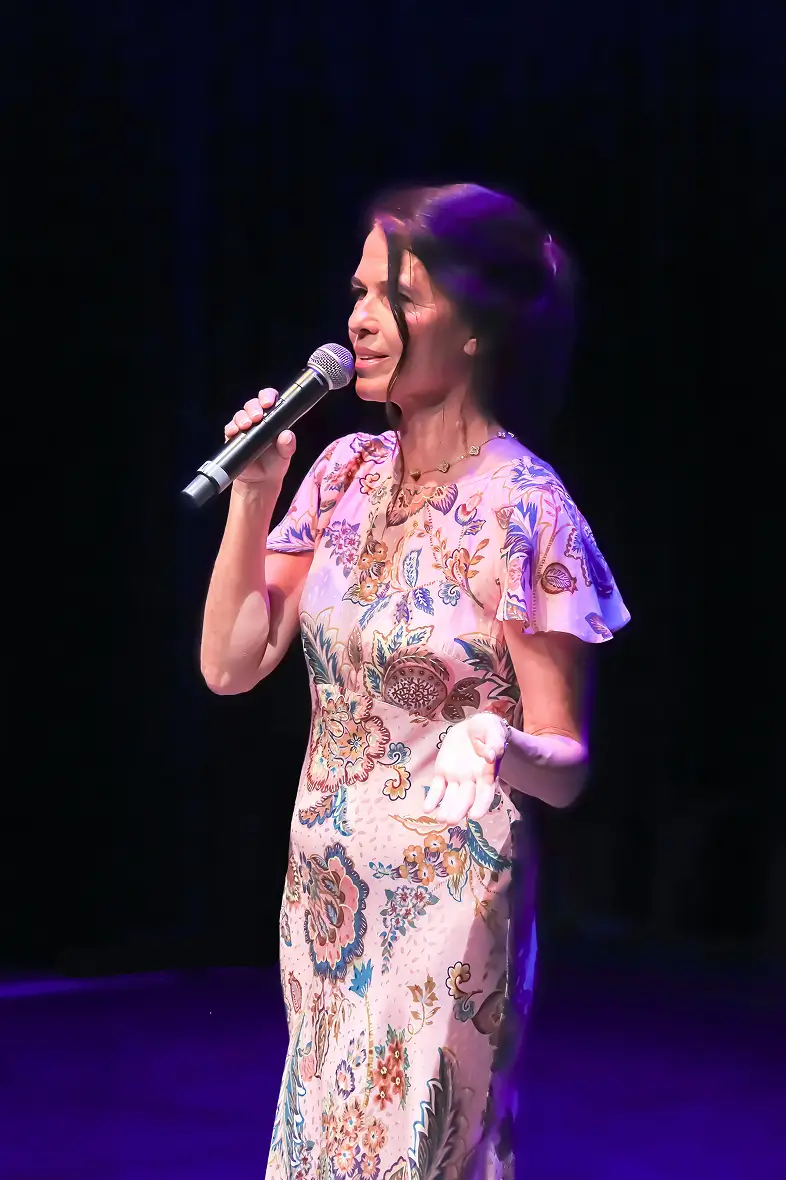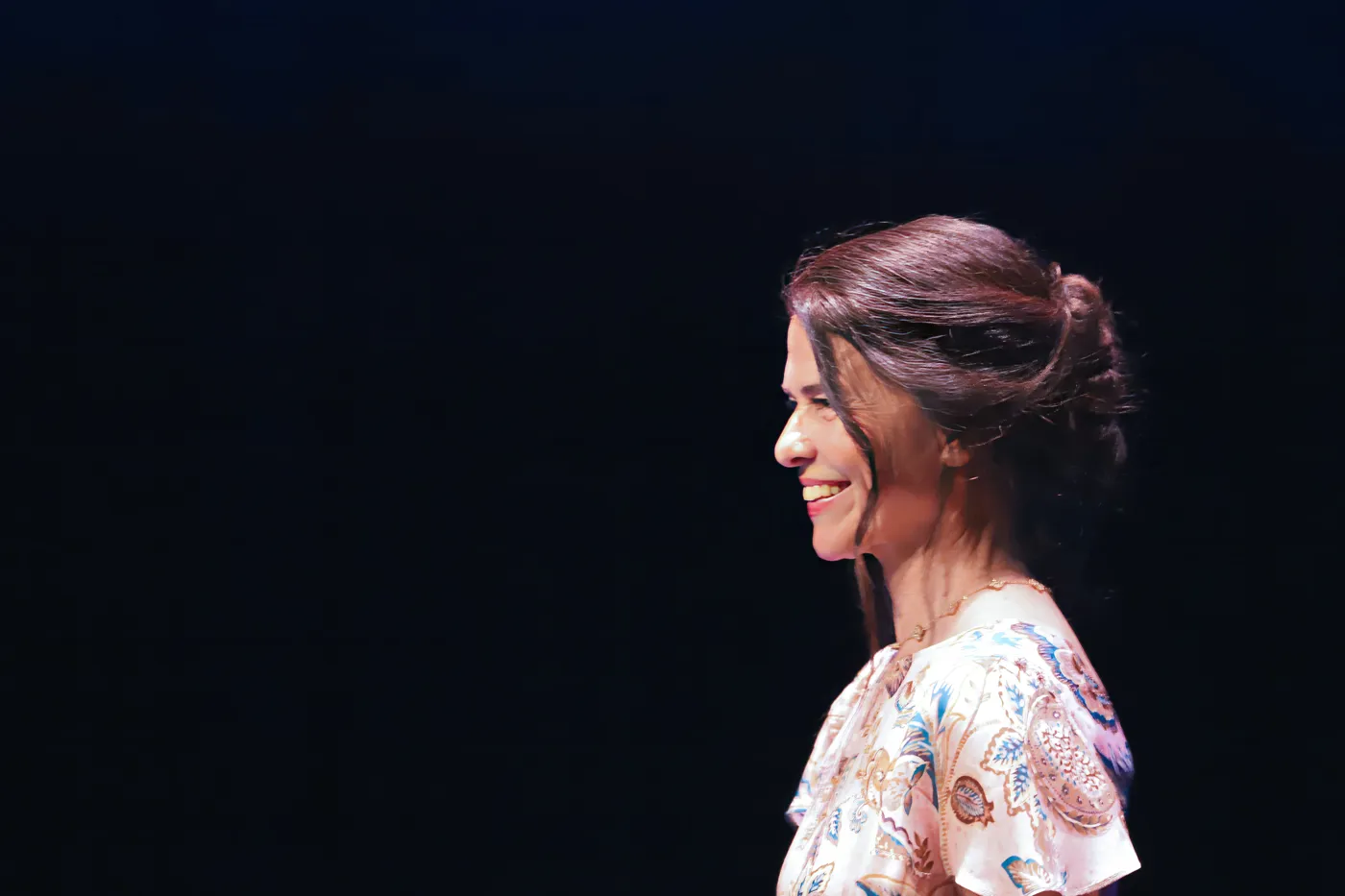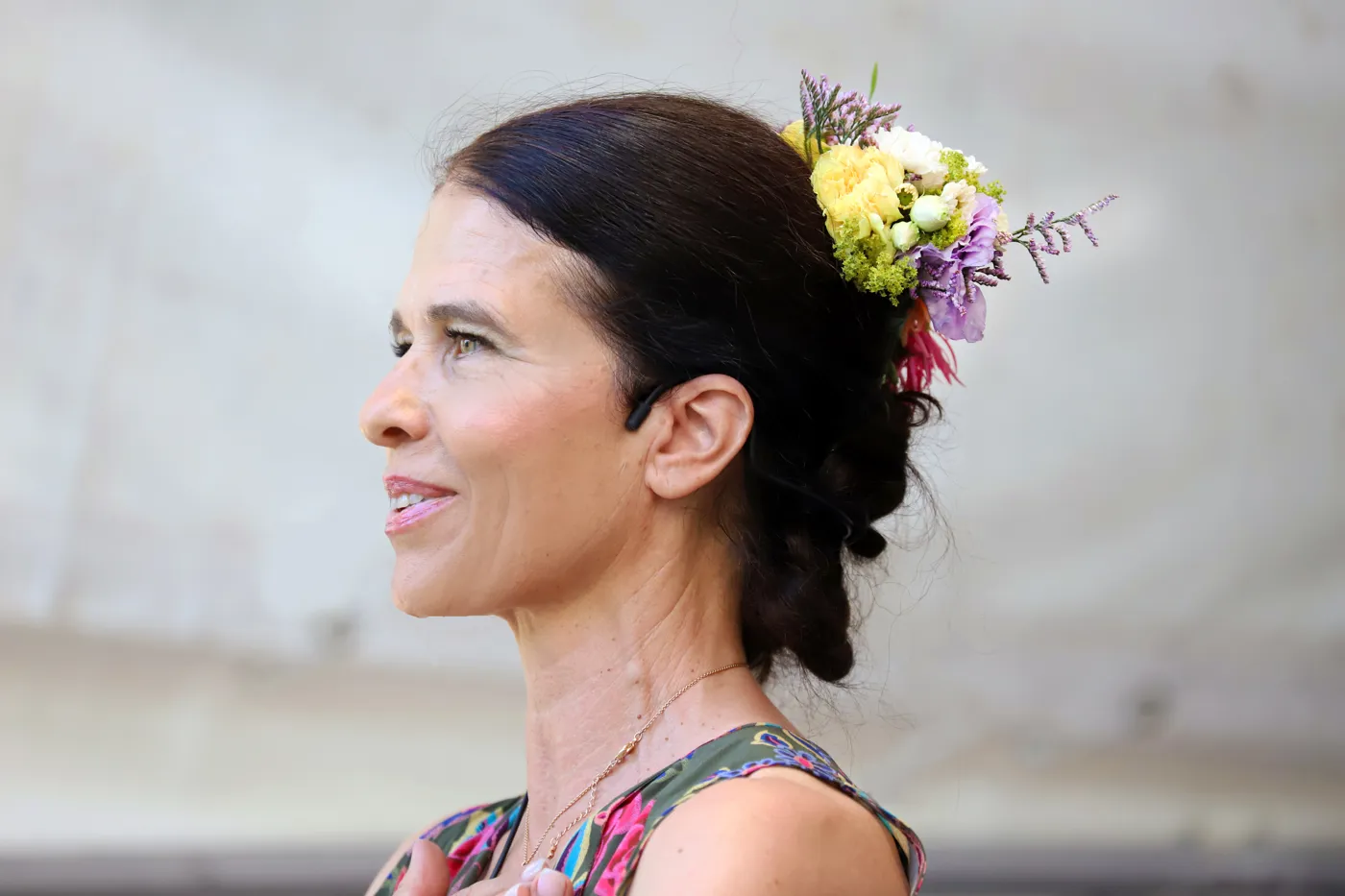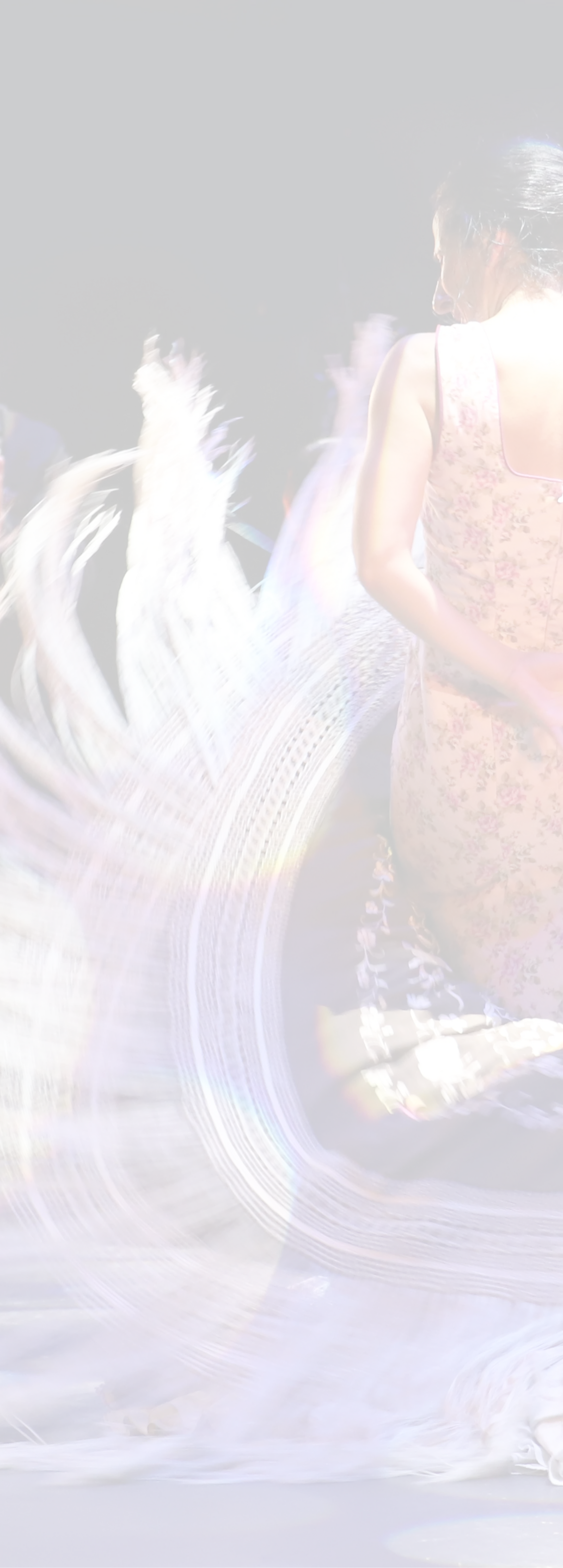
ABOUT
Welcome to my website.
Please take your time to look around! In the various sections, you will find information about my career, pictures and reflections on my work as a dancer, teacher and choreographer. Dance is the centre of my life and a constant source of inspiration to live, study, shape and pass on in all its facets.
Since my engagements as a dancer, I have created a large number of productions that constantly seek to connect with other art forms and offer creative surprises.
Dance is movement, never standing still. Dance involves the relentless demand to break new ground in search of the most effective artistic expression. Take part in my interpretations of this art form.
Herzlich Willkommen auf meiner Website,
Schauen Sie sich in Ruhe um! In den verschiedenen Kapiteln finden Sie Informationen über meinen Werdegang, Bilder und Betrachtungen meines Schaffens als Tänzerin, Pädagogin und Choreografin. Der Tanz ist das Zentrum meines Lebens und immerwährende Inspiration, Ihn in allen Facetten zu leben, zu studieren, zu formen und weiterzugeben.
Entstanden sind, seit meinen Engagements als Tänzerin, eine Vielzahl von Produktionen, die immer wieder Vernetzung mit anderen Kunstgattungen und die kreative Überraschung suchen.
Tanz ist Bewegung, niemals Stillstand. Tanz beinhaltet unerbittliche Forderung, Schritte auf neues Terrain zu setzen, auf der Suche nach dem wirkungsvollsten künstlerischen Ausdruck. Haben Sie teil an meinen Interpretationen dieser Kunst.
Bienvenidos a mi página web,
¡echad un vistazo con calma! En los diferentes apartados encontraréis información sobre mi trayectoria, imágenes y reflexiones sobre mi trabajo como bailarina, profesora y coreógrafa. La danza es el centro de mi vida y una inspiración constante para vivirla en todas sus facetas, estudiarla, darle forma y transmitirla.
Desde mis compromisos como bailarina, han surgido numerosas producciones que buscan constantemente la interconexión con otras disciplinas artísticas y la sorpresa creativa.
La danza es movimiento, nunca estancamiento. La danza implica la exigencia implacable de dar pasos hacia nuevos territorios, en busca de la expresión artística más eficaz. Participe en mis interpretaciones de este arte.
Dance is the ultimate embodiment of the present moment. Finding it and not letting it slip away is what makes a good dancer so magical. For me, the ultimate goal is to help people develop their own approach to work, enabling them to understand and process the content, execution and context of a movement so that they can ultimately live it in the moment. It doesn't matter whether I'm teaching or working on a choreography, this approach shapes my style. In recent years, I have been able to train classical dancers, opera singers and actors, and build up a large repertoire of movement material in training and choreography.
As someone who was searching for her path, I grew into the profession of producer without having planned it. It is a profession that requires constant reinvention. Artistic independence comes at the price of the uncertainties of the free market, yet it is so essential for being able to create your own theatre from within yourself. The everyday life of a freelance dancer requires perseverance, discipline, the ability to suffer and an unshakeable belief in oneself, the performers and the piece. I get to know the stage in all its perspectives, from the director's chair, behind the microphone when I announce a piece, tell its story and guide the audience into the story.
Der Tanz ist die äußerste Verkörperung des gegenwärtigen Moments. Ihn zu finden, nicht zu vergeben macht den Zauber eines guten Tänzers aus. Es ist für mich das höchste Ziel, in den Menschen eine eigene Arbeitshaltung zu entwickeln, die es ermöglicht, Inhalte, Ausführung und Zusammenhänge in einer Bewegung zu verstehen, zu verarbeiten um sie schließlich im Moment zu leben. Es ist unwesentlich, ob ich unterrichte oder an einer Choreografie arbeite, dieser Ansatz prägt meinen Stil. In den letzten Jahren konnte ich klassische Tänzer, Opernsänger oder Schauspieler mit ausbilden und einen großen Fundus an Bewegungsmaterial im Training sowie der Choreografie anlegen.
Als Suchende bin ich, ohne es geplant zu haben, in den Beruf der Produzentin hinein gewachsen. Ein Beruf, den man ständig selber neu erfinden muß. Künstlerische Unabhängigkeit zum Preis der Unsicherheiten des freien Marktes und doch so essentiell wichtig, um aus sich selbst heraus eigenes Theater erschaffen zu können. Der Alltag einer freischaffenden Tänzerin erfordert Ausdauer, Disziplin, Leidensfähigkeit und unerschütterlichen Glauben an sich selbst, die Darsteller und das Stück. Die Bühne lerne ich in all ihren Perspektiven kennen, vom Regieplatz aus, hinter dem Mikrofon wenn ich ein Stück ankündige, über seinen Werdegang erzähle, das Publikum zur Geschichte hinführe.
La danza es la encarnación más extrema del momento presente. Encontrarlo, no perdonarlo, es lo que hace la magia de un buen bailarín. Para mí, el objetivo más elevado es desarrollar en las personas una actitud de trabajo propia que les permita comprender y procesar los contenidos, la ejecución y las conexiones de un movimiento para, finalmente, vivirlo en el momento. No importa si estoy enseñando o trabajando en una coreografía, este enfoque caracteriza mi estilo. En los últimos años he podido formar a bailarines clásicos, cantantes de ópera y actores, y he creado un gran fondo de material de movimiento tanto en el entrenamiento como en la coreografía.
Como buscadora, sin haberlo planeado, he ido creciendo en la profesión de productora. Una profesión en la que hay que reinventarse constantemente. La independencia artística a costa de las incertidumbres del mercado libre y, sin embargo, tan esencial para poder crear tu propio teatro desde ti mismo. El día a día de una bailarina autónoma requiere perseverancia, disciplina, capacidad de sufrimiento y una fe inquebrantable en uno mismo, en los intérpretes y en la obra. Conozco el escenario en todas sus perspectivas, desde la cabina de dirección, detrás del micrófono cuando anuncio una obra, cuento su trayectoria y guío al público hacia la historia.

FESTIVAL
The Stuttgart Flamenco Festival
The Stuttgart Flamenco Festival was founded in 2010 by dancers and choreographers Catarina Mora and Miguel Ángel Espino. Since then, the festival has taken place once a year and has become a fixture in the first week of the summer holidays in Baden-Württemberg. In 2020, the festival was included in the City of Stuttgart's ongoing project funding programme. Since 2024, the festival has been a gUG (non-profit organisation) committed to preserving intangible world cultural heritage.
By positioning the festival during the holiday month, dancers from all federal states can participate. The festival brings performances by professional companies from Spain, the legendary ‘Gala Flamenca’ and the evening of amateurs, the ‘flamenquitos©’, to the Theaterhaus stage. This is followed by six days of workshops and smaller events on the theme of flamenco at the Tanz und Performance production centre, from Monday to Saturday. Over a period of nine days, flamenco is experienced, created and perceived in a tightly packed programme.
DAS STUTTGARTER FLAMENCO FESTIVAL
Das Stuttgarter Flamenco Festival wurde im Jahr 2010 von der Tänzern und Choreographen Catarina Mora und Miguel Ángel Espino gegründet. Seither fand das Festival jährlich einmal statt und hat sich in der ersten Sommerferienwoche Baden-Württembergs fest etabliert. Im Jahr 2020 wurde das Festival in die verstetigte Projektförderung der Stadt Stuttgart aufgenommen. Seit 2024 ist das Festival eine gUG (gemeinnützig), die sich der Pflege des immateriellen Weltkulturerbes verpflichtet.
Durch die Positionierung des Festivals im Ferienmonat können Tänzer*innen aus allen Bundesländern teilnehmen. Das Festival bringt Vorstellungen von professionellen Companien aus Spanien, die legendären „Gala Flamenca“ sowie dem Abend der Amateure, die„flamenquitos©“ auf die Theaterhaus-Bühne. Anschließend finden für sechs Tage, Montag bis Samstag, Workshops und kleinere Veranstaltungen rund um das Thema Flamenco im Produktionszentrum Tanz und Performance statt. Über eine Dauer von 9 Tagen wird der Flamenco straff gebündelt erlebt, gestaltet und wahrgenommen.
EL FESTIVAL DE FLAMENCO DE STUTTGART
El Festival de Flamenco de Stuttgart fue fundado en 2010 por los bailarines y coreógrafos Catarina Mora y Miguel Ángel Espino. Desde entonces, el festival se celebra una vez al año y se ha consolidado en la primera semana de las vacaciones de verano de Baden-Württemberg. En 2020, el festival fue incluido en la financiación permanente de proyectos de la ciudad de Stuttgart. Desde 2024, el festival es una gUG (organización sin ánimo de lucro) dedicada a la conservación del patrimonio cultural inmaterial.
Al celebrarse durante el mes de vacaciones, el festival permite la participación de bailarines de todos los estados federados. El festival lleva al escenario del Theaterhaus actuaciones de compañías profesionales españolas, la legendaria «Gala Flamenca» y la velada de aficionados, los «flamenquitos©». A continuación, durante seis días, de lunes a sábado, se celebran talleres y pequeños eventos relacionados con el flamenco en el centro de producción de danza y performance. Durante nueve días, el flamenco se vive, se crea y se percibe de forma intensa.
The Professionals
Stuttgart is a multicultural, diverse city and therefore a very suitable venue. The networking opportunities created by the Flamenco Festival are intended above all to offer artists and people a more diverse exchange and opportunities for growth. One of the goals in this context is to promote understanding between different cultures, tolerance and humanity, as has always been the case in the art of flamenco.
This unique festival is very well received by the people of Stuttgart.
'A flamenco festival is a great asset to our city. It underlines the importance of Stuttgart as a city of dance.’
Tadeusz Matacz, Director of the John Cranko School, Stuttgart
Artist portrait at the PZ
During the festival week, the ‘PZ’, the Production Centre for Dance and Performance, becomes a venue for smaller, more intimate events.
The amateur level ‘flamenquitos©’
Semi-professionals and amateurs from the world of flamenco, i.e. people who have a ‘normal’ job during the day and spend their free time practising flamenco, are invited to show off their skills for one evening at the Theaterhaus.
The ‘flamenquitos go europe’ scholarship programme
The Stuttgart Flamenco Festival actively participates in cultural exchange. Every year, a group of children is invited to the festival to perform on the evening of the flamenquitos. The children receive the workshop as a scholarship.
This programme was launched to promote flamenco as a world cultural heritage. The aim is to give even the youngest children the best teaching and the most sustainable prospects.
The workshops
During the festival week, artistic exchange is intensified in several choreography and technique workshops as well as small evening events. Participants have the opportunity to learn about the different working methods in flamenco and to overcome boundaries, including interpersonal ones, in their own understanding. Cultural exchange is also made possible by the participants from a variety of European countries.
Die Profis
Stuttgart ist eine multikulturelle, vielfältige Stadt und dadurch ein sehr passender Veranstaltungsort. Die durch das Flamenco-Festival entstehende Vernetzung soll vor allem den Künstler*innen und Menschen einen vielseitigeren Austausch und Wachstumsmöglichkeit bieten. Eines der Ziele in diesem Zusammenhang ist die Verständigung der verschiedenen Kulturen, Toleranz und Menschlichkeit, wie sie in der Flamenco-Kunst seit jeher existiert.
Das in dieser Form einzigartige Festival wird in Stuttgart von der Bevölkerung sehr gut angenommen.
„Ein Flamenco Festival ist eine große Bereicherung für unsere Stadt. Es unterstreicht die Wichtigkeit der Stadt Stuttgart als Tanz-Stadt.“
Tadeusz Matacz, Direktor der John Cranko Schule, Stuttgart
Künstlerporträt im PZ
Während der Festivalwoche wird das „PZ“, das Produktionszentrum Tanz und Performance, zum Veranstaltungsort im kleineren, intimen Rahmen
Die Amateurebene „flamenquitos©“
Semiprofessionelle und Amateure aus dem Flamenco-Bereich, also Menschen,
die tagsüber einem „normalen” Beruf nachgehen und sich in ihrer Freizeit
mit Flamenco beschäftigen, werden aufgerufen, für einen Abend im Theaterhaus ihr Können zu zeigen
Das Stipendiatenprogramm „flamenquitos go europe“
Das Stuttgarter Flamenco Festival nimmt aktiv am Kulturaustausch teil. Jedes Jahr wird eine Gruppe Kinder zum Festival eingeladen, um am Abend der flamenquitos, aufzutreten. Den Workshop erhalten die Kinder als Stipendium.
Dieses Programm wurde zur Förderung des Weltkulturerbes Flamenco ins Leben gerufen. Dadurch sollen bereits die Jüngsten den besten Unterricht und die nachhaltigsten Perspektiven erhalten.
Die Workshops
Während der Festivalwoche wird in mehreren Choreographie- und Technik-Workshops sowie kleinen Abendveranstaltungen der künstlerische Austausch intensiviert. Es besteht die Möglichkeit, die unterschiedlichen Arbeitsweisen im Flamenco kennen zu lernen und ganz konkret im eigenen Verständnis die Grenzen, auch zwischenmenschliche, zu überwinden. Durch die Teilnehmer*innen aus einer Vielzahl europäischer Länder wird auch der kulturelle Austausch ermöglicht.
Los profesionales
Stuttgart es una ciudad multicultural y diversa, por lo que resulta un lugar muy adecuado. Las oportunidades de networking que crea el Festival de Flamenco tienen como objetivo principal ofrecer a los artistas y al público un intercambio más diverso y oportunidades de crecimiento. Uno de los objetivos en este contexto es promover el entendimiento entre las diferentes culturas, la tolerancia y la humanidad, como siempre ha sido el caso en el arte del flamenco.
Este festival único tiene una gran acogida entre los habitantes de Stuttgart.
«Un festival de flamenco es un gran activo para nuestra ciudad. Subraya la importancia de Stuttgart como ciudad de la danza».
Tadeusz Matacz, director de la Escuela John Cranko, Stuttgart
Retrato de artista en el PZ
Durante la semana del festival, el «PZ», el Centro de Producción de Danza y Espectáculos, se convierte en un lugar para eventos más pequeños e íntimos.
Los «flamenquitos©» de nivel amateur.
Se invita a semiprofesionales y aficionados del mundo del flamenco, es decir, personas que tienen un trabajo «normal» durante el día y dedican su tiempo libre a practicar el flamenco, a mostrar sus habilidades durante una noche en el Theaterhaus.
El programa de becas «flamenquitos go europe»
El Festival de Flamenco de Stuttgart participa activamente en el intercambio cultural. Cada año, se invita a un grupo de niños al festival para que actúen en la velada de los flamenquitos. Los niños reciben el taller como una beca. Este programa se puso en marcha para promover el flamenco como patrimonio cultural mundial. El objetivo es ofrecer incluso a los niños más pequeños la mejor enseñanza y las perspectivas más sostenibles.
Los talleres
Durante la semana del festival, el intercambio artístico se intensifica en varios talleres de coreografía y técnica, así como en pequeños eventos nocturnos. Los participantes tienen la oportunidad de aprender sobre los diferentes métodos de trabajo en el flamenco y de superar barreras, incluidas las interpersonales, en su propia comprensión. El intercambio cultural también es posible gracias a la participación de personas procedentes de diversos países europeos.
CALENDAR
Past Event 3
Lorem Ipsum PLACE
Past Event 2
Lorem Ipsum PLACE
Past Event 1
Lorem Ipsum PLACE
Aktion Weihnachten
Staatstheater Stuttgart, Oberer Schloßgarten 6, 70173 Stuttgart
Cantiamo
Hochschule für Musik und Darstellende Kunst Urbanstr. 25, 70182 Stuttgart
Wintertanztage
Produktionszentrum Tanz und Performance, Tunnelstr. 16, 70469 Stuttgart
PRODUKTIONEN

Flamenco has been designated an intangible cultural heritage of humanity. This underscores the fact that it is a major art form whose preservation and cultivation represent a significant undertaking. The theatre productions that have been created since 1995 not only take cultural influences into account, but also related art forms, which make the experience of these productions very exciting and novel.
Flamenco is often understood as an entertaining art form. In order to bring about lasting change in the audience, the productions I have created in my life are designed in such a way that the content of a story develops the viewer's awareness of the depth and complexity of this art form and its far-reaching cultural traces.
Flamenco wurde zum immateriellen Weltkulturerbe der Menschheit ernannt. Was die Tatsache unterstreicht, dass es sich um eine große Kunstform handelt, deren Erhaltung und Pflege eine große Aufgabe bedeutet. In den Theaterproduktionen, die seit 1995 entstanden sind, sind nicht nur die kulturellen Einflüße berücksichtigt, sondern ebenso angrenzende Kunstsparten, die das Erleben dieser Produktionen sehr spannend und neu machen.
Gemeinhin wird Flamenco oft als unterhaltende Kunst verstanden. Um nachhaltig eine Veränderung im Publikum zu bewirken, sind die Produktionen, die ich in meinem Leben herausgebracht habe so gestaltet, dass sich, durch die Inhalte einer Geschichte ein Bewußtsein beim Zuschauer für die Tiefe und Komplexität dieser Kunst und ihre weitreichenden kulturellen Spuren, entwickelt.
El flamenco ha sido declarado Patrimonio Cultural Inmaterial de la Humanidad. Esto subraya el hecho de que se trata de una gran forma de arte cuya conservación y mantenimiento suponen una gran tarea. En las producciones teatrales creadas desde 1995 no solo se tienen en cuenta las influencias culturales, sino también otras disciplinas artísticas afines, lo que hace que la experiencia de estas producciones sea muy emocionante y novedosa.
Por lo general, el flamenco se entiende como un arte de entretenimiento. Para lograr un cambio duradero en el público, las producciones que he realizado a lo largo de mi vida están diseñadas de tal manera que, a través del contenido de una historia, el espectador desarrolle una conciencia de la profundidad y complejidad de este arte y de su amplio legado cultural.

